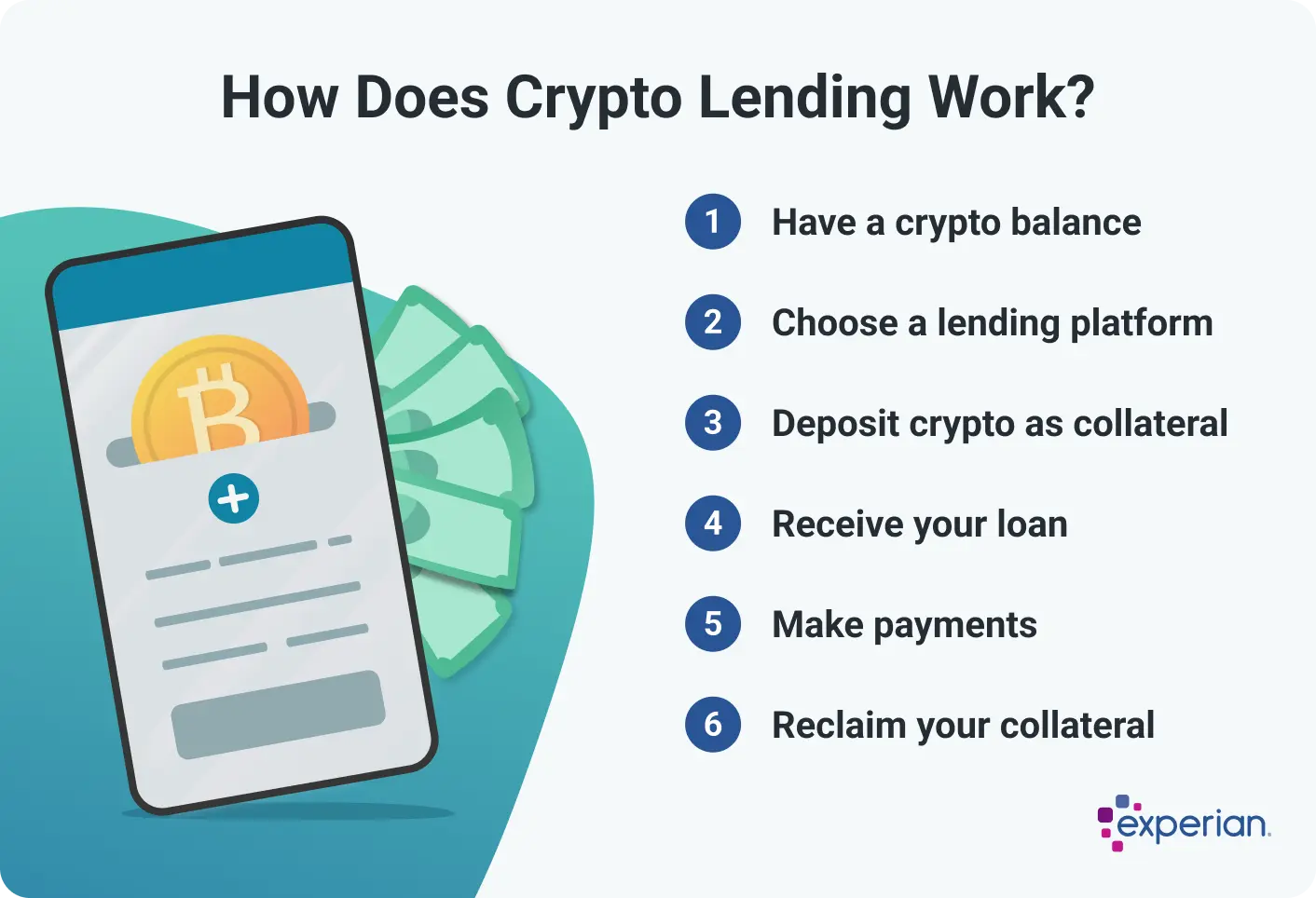What Is a Crypto Loan and How Does It Work?
Quick Answer
Crypto lending allows you to borrow money through a cryptocurrency platform. Borrowers use crypto as collateral to get a loan, often without needing a credit check.

Crypto lending is a way to borrow money in which you pledge a portion of your crypto holdings as collateral for a loan. In return, you receive cash without needing to sell your assets or go through a traditional credit check.
It's become a popular way for crypto holders to access liquidity while staying invested, but it also comes with risks. Before you lock up your digital assets, it's important to understand how crypto lending works, what platforms offer it and whether it makes sense for your financial goals.
What Is Crypto Lending?
With a crypto loan, you pledge a portion of your crypto holdings as collateral for the money you borrow.
As with a secured loan like a car loan or mortgage, you retain ownership of your cryptocurrencies while you pay down the loan. If you fail to repay the loan as agreed, however, you risk losing some or all of your collateral.
Learn more: What Is a Secured Loan?
How Does Crypto Lending Work?
The borrowing process with a crypto-backed loan may vary depending on which platform you choose. In general, though, here's how it works:
- Check your balance. Depending on the platform, you may be able to borrow as much as 97% of your digital asset balance, though many platforms have lower loan-to-value (LTV) limits. Check your crypto balance to determine whether you can get enough to meet your borrowing needs.
- Choose a lending platform. Next, you'll want to shop around and compare lending platforms. Factors to consider include the platform's reputation, supported cryptocurrencies, interest rates, LTV maximums, fees, repayment terms and security features. In some cases, you may need to exchange an ineligible currency for an eligible one before applying.
- Deposit your collateral. You'll transfer some or all of your crypto to the platform as collateral.
- Receive your loan. Once the collateral is confirmed, you'll receive your loan, usually in the form of fiat currency or stablecoins. No credit check is required, and funds are often disbursed quickly.
- Make payments. You'll repay your loan in regular installments, including any interest charged. The platform holds your crypto until the loan is fully repaid.
- Reclaim your collateral. After you've paid off the loan and interest, your crypto collateral is returned to your wallet. If your collateral's value drops too much during the loan period, however, you may need to add more or risk liquidation.

Pros and Cons of Crypto Lending
While there are some benefits to getting a crypto-backed loan, it's crucial that you carefully consider the potential risks involved with high-volatility securities. Here's what to keep in mind.
Pros
-
Low interest rates: Because they're secured by an asset, crypto loans may charge lower interest rates than many unsecured personal loans and credit cards, especially if you have less-than-stellar credit.
-
Ownership: If you need cash, a crypto loan allows you to get the money you need without forcing you to sell your holdings.
-
Quick funding: Once you're approved, you may be able to get your loan funds within hours.
-
No credit check: In many cases, the crypto lending platform won't run a credit check when you apply. If your credit history is less than stellar, this could be an attractive alternative to bad credit loans.
Cons
-
Minimum borrowing requirements: With loan minimums and LTV maximums, you may simply not have enough holdings to secure the minimum loan amount the lender offers.
-
Repayment terms: Crypto loans typically have terms of 12 months or less (though some may be longer), which means you don't have a lot of time to repay them. If you default on the debt, the platform may liquidate your holdings, which could result in a tax bill if your portfolio has gained in value since you first bought the digital assets.
-
Margin calls: A margin call occurs when the value of your collateral assets drops below a threshold set by the lender. If the price of your crypto assets drops significantly—which could be likely due to the volatility of the crypto market—you may need to deposit more into your account to keep your assets. If you don't, the platform may choose to sell your holdings.
-
Asset inaccessibility: As long as your loan is outstanding, you can't use or trade your crypto assets. In other words, if the price of your assets tanks, you're stuck, and there's no insurance against the loss.
How to Choose a Crypto Lending Platform
As you shop around, it's important to pay attention to several different features, including the following:
- Interest rates: Platforms may offer varying interest rates based on your LTV and the type of cryptocurrency you use as collateral.
- Fees: Some platforms charge origination fees, liquidation fees, custody fees, withdrawal fees and early repayment penalties. Always read the fine print to understand the full cost of using the platform.
- Repayment term: Choose a lender that offers repayment terms that align with your budget and goals.
- LTV max: The LTV determines how much you can borrow relative to your crypto collateral. A lower LTV is safer but gives you access to less cash.
- Supported currencies: Not all platforms support every crypto asset. Make sure your preferred crypto is eligible for lending or borrowing before committing.
- Platform risks: Choose a platform with strong user reviews, transparent practices and robust security features. Look for things like cold storage and two-factor authentication. Finally, check whether the platform is registered or licensed in your jurisdiction. Platforms that follow regulatory standards may offer greater legal protections.
- Liquidation policies: Understand how each platform handles collateral if the market turns. Some platforms automatically liquidate assets once your LTV crosses a threshold, while others may give you a warning first.
Alternatives to Crypto Lending
As with any financial decision, it's a good idea to research and compare several options before you settle on one. That's especially the case with relatively risky decisions like using digital assets to secure a loan.
Here are some potential alternatives to consider:
- Sell your crypto. If you don't have enough crypto holdings to meet minimum loan requirements or you need more than you're allowed to borrow, it may make sense to simply sell the digital assets you have to get the funds you want. Just keep in mind that there can be tax implications when you sell crypto.
- Take out a personal loan. Personal loans can be more expensive than crypto loans, but the upside is that many are unsecured, and you'll typically get a longer repayment period.
- Apply for a credit card with a 0% intro annual percentage rate (APR). If you have good or excellent credit, you may be able to get approved for a credit card with an introductory 0% APR promotion. These deals allow you to make purchases and pay them off over 12 to 24 months without interest. Just keep in mind that the card's potentially high ongoing interest rate will apply to any balance left over after the introductory period ends.
- Ask family or friends for help. Depending on your situation, you may be able to ask a family member or friend to help you with your financial issues. Be clear about the repayment agreement, and make sure you stick to it to avoid damaging the relationship.
Here's an overview of alternative financing options and how they compare to a crypto loan.
Alternative Financing to a Crypto Loan
| Crypto Loan | Personal Loan | 0% Intro APR Credit Card | Family or Friends | |
|---|---|---|---|---|
| Credit check? | No | Yes | Yes | No |
| APR range | 3%-19% | 7%-36% | 0% during the intro period; varies after | Varies |
| Loan amount | $1,000+ | $250-$100,000 | Varies based on creditworthiness | Varies |
| Term length | Usually 12 months or less | 1-7 years | 12-24 months | Varies |
| Best for | People with lower credit scores and sizable crypto balances | People with good or excellent credit | People with good or excellent credit | People with lower credit scores who have willing loved ones |
Whatever you do, take your time to shop around and carefully mull over your options. Consider using Experian's comparison tool to compare personalized credit card and personal loan offers.
Tip: Avoid high-cost forms of financing like payday loans and auto title loans. While these can provide you with fast cash, they have incredibly short repayment terms and exorbitant interest rates.
Compare personal loan rates
Find APRs from 4.99% to 35.99% and flexible terms of 12 to 120 months. Loan amounts range from $1,000 up to $250,000, with funding available the same day or up to 7 days.
Offers from our partners
View all of our Best Personal Loans for 2026 to see what you’re likely to qualify for, and the rates and terms you might get.
Frequently Asked Questions
Build Your Credit to Expand Your Options
One of the reasons crypto loans can be appealing is that there's generally no credit check involved, and the alternatives can be high-cost loans. Regardless of how you choose to handle your current financial situation, take time to improve your credit so you'll have more options in the future when you need financing.
Start by checking your credit to review areas that you can address. You can check your FICO® ScoreΘ and credit report for free with Experian. Once you've reviewed your credit, take action to make improvements. This process can take time and effort, but it can pay off big time in the long run.
Need a loan?
Whether you're shopping for a car or facing a last-minute expense, compare loan offers matched to your credit profile.
Start now for freeAbout the author
Ben Luthi has worked in financial planning, banking and auto finance, and writes about all aspects of money. His work has appeared in Time, Success, USA Today, Credit Karma, NerdWallet, Wirecutter and more.
Read more from Ben